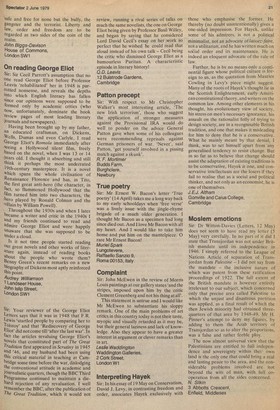On reading George Eliot
Sir: Sir Cecil Parrott's assumption that no one read George Eliot before Professor Leavis 'rehabilitated' her in 1948 is parrotted nonsense, and reveals the depths into which English literacy has fallen since our opinions were supposed to be formed only by academic critics (who now, unfortunately, dominate the book review pages of most leading literary Journals and newspapers).
Having been brought up by my father, an educated craftsman, on Dickens, Wells, Dumas and even Carlyle, I read George Eliot's Romola immediately after seeing a Hollywood silent film, freely based on the novel, when I was 13 or 14 Years old. I thought it absorbing and still think it perhaps the most underrated 19th-century masterpiece. It is a novel Which spans the whole civilisation of Renaissance Florence and has, in Tito, the first great anti-hero (the character, in fact, so flummoxed Hollywood that the film turned him into two characters, the hero played by Ronald Colman and the Villain by William Powell).
Throughout the 1930s and when I later became a writer and critic in the 1940s I and my friends continued to read and admire George Eliot and were happily unaware that she was supposed to be under a cloud.
Is it not time people started reading our great novels and other works of literature again, instead of reading books about the people who wrote them? Benny Green's recent remarks on a new biography of Dickens most aptly reinforced this point.
Audrey Williamson 1 Landseer House, John Islip Street, London SW1 Sir: Your reviewer of the George Eliot Letters says that it was in 1948 that F.R. Lewis 'startled people by comparing her to Tolstoy' and that 'Rediscovery of George Eliot' did not come till 'after the last war'. In fact the articles revaluing George Eliot's novels that constituted part of The Great Tradition first appeared in Scrutiny in 1945 and '46, and my husband had been using this critical material in teaching at Cambridge some time before the war, dislodging the conventional attitude in academic and Journalistic quarters, though the BBC Third Programme continued to maintain a diehard rejection of any revaluation. I well remember the BBC, after the publication of The Great Tradition, which it would not review, running a rival series of talks on much the same novelists, the one on George Eliot being given by Professor Basil Willey, and began by saying that he considered Lord David Cecil's essay on her work so perfect that he wished he could read that aloud instead of his own talk — Cecil being the critic who dismissed George Eliot as a humourless Puritan. A characteristic episode in literary history!
Q.D. Leavis 12 Bulstrode Gardens, Cambridge






































 Previous page
Previous page